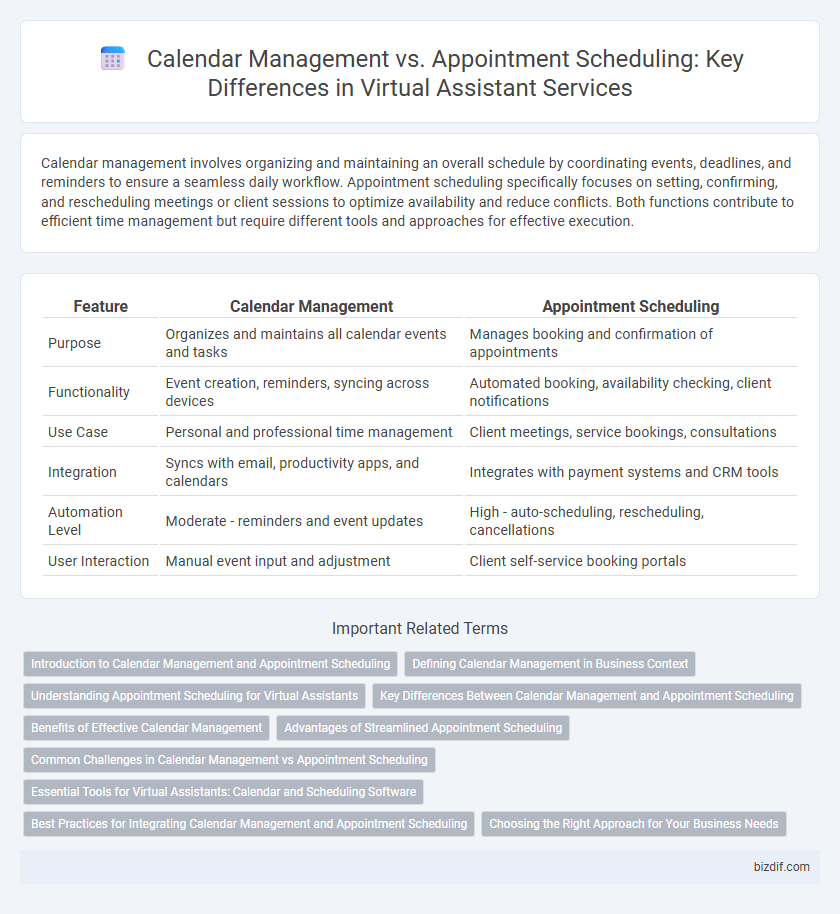Calendar management involves organizing and maintaining an overall schedule by coordinating events, deadlines, and reminders to ensure a seamless daily workflow. Appointment scheduling specifically focuses on setting, confirming, and rescheduling meetings or client sessions to optimize availability and reduce conflicts. Both functions contribute to efficient time management but require different tools and approaches for effective execution.
Table of Comparison
| Feature | Calendar Management | Appointment Scheduling |
|---|---|---|
| Purpose | Organizes and maintains all calendar events and tasks | Manages booking and confirmation of appointments |
| Functionality | Event creation, reminders, syncing across devices | Automated booking, availability checking, client notifications |
| Use Case | Personal and professional time management | Client meetings, service bookings, consultations |
| Integration | Syncs with email, productivity apps, and calendars | Integrates with payment systems and CRM tools |
| Automation Level | Moderate - reminders and event updates | High - auto-scheduling, rescheduling, cancellations |
| User Interaction | Manual event input and adjustment | Client self-service booking portals |
Introduction to Calendar Management and Appointment Scheduling
Calendar management encompasses organizing, prioritizing, and maintaining an efficient schedule by integrating events, deadlines, and tasks across multiple platforms. Appointment scheduling specifically refers to booking and confirming meetings or consultations, ensuring alignment between clients' availability and service providers' calendars. Virtual assistants leverage advanced tools and AI-driven software to streamline both processes, optimizing time management and reducing scheduling conflicts.
Defining Calendar Management in Business Context
Calendar management in a business context involves organizing and maintaining an accurate and accessible schedule of meetings, deadlines, and events to optimize productivity and time allocation. It includes coordinating multiple calendars, setting reminders, and ensuring conflict-free time blocks for critical tasks and engagements. Effective calendar management enables seamless workflow coordination and enhances overall operational efficiency for professionals and teams.
Understanding Appointment Scheduling for Virtual Assistants
Appointment scheduling for virtual assistants involves directly coordinating specific meeting times between clients and service providers, ensuring accurate time slot allocation and minimizing conflicts. This process requires detailed tracking of availability, confirmations, and cancellations, distinct from broader calendar management that encompasses overall organizational tasks. Effective appointment scheduling optimizes workflow efficiency and enhances client satisfaction through precise time management.
Key Differences Between Calendar Management and Appointment Scheduling
Calendar management involves organizing and maintaining an overview of events, deadlines, and tasks across multiple days or weeks, ensuring a balanced and efficient time allocation. Appointment scheduling specifically focuses on booking, confirming, and managing individual meetings or sessions, often coordinating availability between parties. The key difference lies in calendar management's broader scope of planning versus appointment scheduling's targeted task of securing specific time slots.
Benefits of Effective Calendar Management
Effective calendar management enhances productivity by providing a clear overview of daily tasks, deadlines, and meetings, reducing the risk of conflicts and missed appointments. By prioritizing and allocating time efficiently, it ensures optimal use of work hours, leading to improved time management and goal achievement. This proactive approach minimizes stress and increases professional reliability, making it a key benefit of using virtual assistants.
Advantages of Streamlined Appointment Scheduling
Streamlined appointment scheduling enhances efficiency by automating the booking process, reducing scheduling conflicts and no-shows. Virtual assistants integrate calendar management tools to synchronize appointments in real-time, ensuring accurate availability and seamless updates. This optimization saves time for both businesses and clients, improving overall productivity and customer satisfaction.
Common Challenges in Calendar Management vs Appointment Scheduling
Calendar management often struggles with overlapping events and time zone discrepancies, causing scheduling conflicts and missed appointments. Appointment scheduling faces challenges in real-time availability updates and automated reminders, leading to double bookings and no-shows. Both require seamless integration with email and CRM systems to streamline workflows and improve user experience.
Essential Tools for Virtual Assistants: Calendar and Scheduling Software
Calendar management involves organizing, updating, and maintaining events to ensure seamless daily workflows, while appointment scheduling focuses on booking meetings and coordinating availability between parties. Essential tools for virtual assistants include Google Calendar, Microsoft Outlook, and Calendly, which streamline event tracking and automate scheduling tasks. These platforms enhance productivity by integrating reminders, time zone adjustments, and synchronization across multiple devices.
Best Practices for Integrating Calendar Management and Appointment Scheduling
Integrating calendar management with appointment scheduling enhances productivity by automating time slot allocation and reducing conflicts, leveraging tools like Google Calendar and Microsoft Outlook for real-time updates. Best practices include syncing platforms to maintain accuracy, setting buffer times between meetings to avoid overlap, and enabling automated reminders to minimize no-shows. Utilizing AI-powered virtual assistants can further optimize scheduling efficiency by analyzing user preferences and suggesting ideal meeting times.
Choosing the Right Approach for Your Business Needs
Effective calendar management ensures seamless organization of daily tasks, deadlines, and meetings, allowing businesses to maintain productivity and avoid scheduling conflicts. Appointment scheduling focuses on streamlined client or customer bookings, optimizing time slots and enhancing customer experience. Selecting between calendar management and appointment scheduling depends on whether your business prioritizes internal task coordination or client-facing engagement.
Calendar management vs Appointment scheduling Infographic

 bizdif.com
bizdif.com